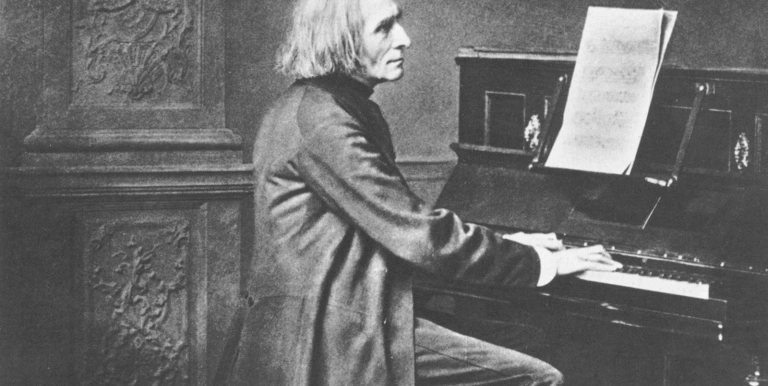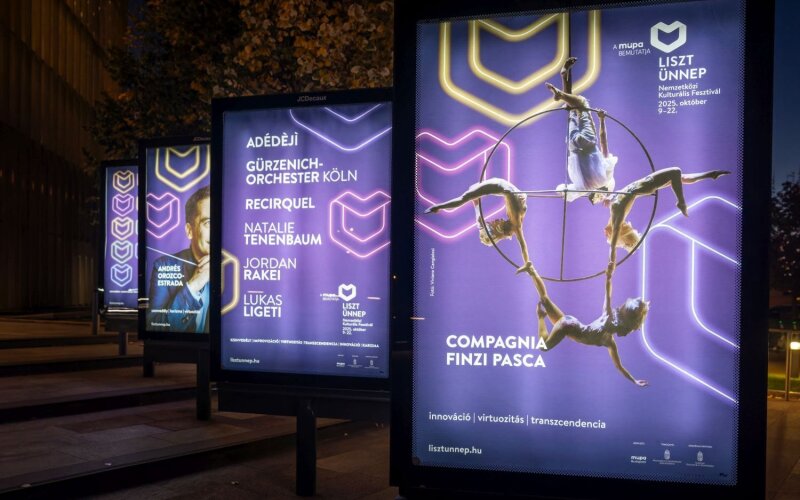In this series, distinguished artists at Liszt Fest tell us what the composer’s art means for them, which works have captured their hearts, and what makes the works they will perform at the festival important to them. This time we talked to composer and conductor György Selmeczi, who will stand at the helm of the Orchestra of the Cluj-Napoca Hungarian Opera at a concert revealing many different facets of the composer.
György Selmeczi’s first encounter with the art of Franz Liszt remains a vivid memory. “I was in my early teens when I was introduced to him, in particular to the incredibly interesting, romantic figure who endures in the public consciousness. As I studied the piano, approaching Liszt’s works technically became something more and more within my reach, and my graduation piece at secondary school was the Sonata in B minor. I became really fond of his music and was filled with admiration as I studied this controversial oeuvre, which is full of extremes.” For the same reason, Selmeczi is annoyed by the simplified image of Liszt, believing that the driving forces of his music deserve deeper consideration. “How was his career influenced by society and the music-historical context, and how was he received at the time? What was it in his art that was not understood, and what in the criticism levelled at him was or was not justified? I was considering all these questions in depth as an adult. To my mind, there’s a lifetime’s worth of mysteries in Liszt’s oeuvre.”
When I ask him what he finds particularly captivating in Liszt’s art, Selmeczi points to the duality inherent in the composer’s inspirations, such as being Hungarian and cosmopolitan at the same time. “We tend to approach his music from the angle of the rhapsodies, which are very difficult technically, while the études inspired by his travels, for instance, are very important. There is a certain humour in the naming itself, applying this genre’s name to these fiendishly difficult pieces, which also happen to be full of meaning.” He also mentions the symphonic poems, the routine disparagement of which led many to take a long time to realize their greatness. The latter genre is close to the heart of Selmeczi, who has tried to revive it during his own composing career. However, he says, misunderstandings continue to cause too many of Liszt’s works to be rarely programmed, when deeper familiarity with the oeuvre would, in fact, reveal its internal logic; for example, showing how the composer reinterpreted certain genres or how he revisited earlier themes from his own career.
Selmeczi’s intention behind the programme of the concert to be given in Müpa Budapest’s Festival Theatre was both to show something new to the audience and to summarize his attitude as a conductor to the work of Liszt. Not only is the composer’s work close to his heart as a performer, but he has also prepared a record’s worth of orchestral arrangements of Liszt’s late piano pieces. One of these, Die Macht der Musik, will be performed at this concert. With its momentousness, this song about the power of music should be considered a solo cantata, says Selmeczi. This evening the singer will be Brigitta Kele, an internationally in-demand soprano who began her career in Cluj-Napoca. Selmeczi is delighted at the prospect of making music with such superb partners because a piece such as the marvellously complex Psalm 13 often proves too challenging for a soloist. “Part of the reason why this wonderful piece is performed so rarely is that few people can sing it well enough. It will now be performed by our beloved and esteemed tenor, Adorján Pataki, so the piece can shine in its full glory.” The programme will begin and end with a symphonic poem. Two movements from the Four Forgotten Waltzes will also be performed, in arrangements by Zoltán Kocsis, who made important transcriptions of works by Liszt – including some that Selmeczi has also transcribed. ”So this concert is a tribute not only to Liszt, but to Zoltán Kocsis as well, who himself gave a Liszt concert in 2006 with the Orchestra of the Cluj-Napoca Hungarian Opera, a great ensemble always able to reinvent itself. He conducted and played the solo part of the Piano Concerto in E-flat major, and then conducted Mazeppa.”
When asked if he has a favourite composition by Liszt – whether on this programme or not – Selmeczi laughs and says he could name a dozen. “I consider Les Préludes a masterpiece, for instance, even though it is overplayed, and I love Missa choralis, which is a surprisingly economical piece. Liszt was not so confident with large-scale forms and would overwrite them a bit in a Romantic spirit, which can be daunting for the audience unless the performance is brilliant. Of course he too can be boring, like many other geniuses, but then, as Pilinszky put it, great works are beyond boredom.”





